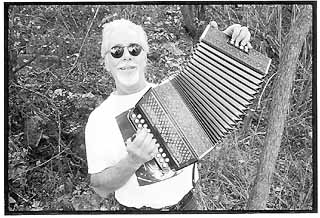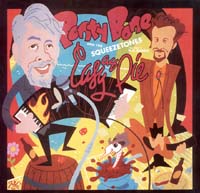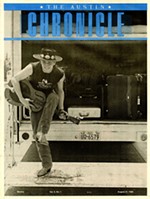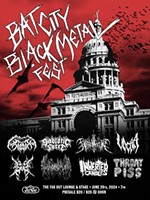Mr. South Austin
By Lee Nichols, Fri., Dec. 4, 1998
|
|
If one were to choose a musician who is emblematic of South Austin, that person would simply have to play accordion. It's only proper. South Austin is utterly funky. So are accordions. For many years, South Austin was shunned by the elite. So were accordions. Today, South Austin is suddenly becoming fashionable. One might argue that accordions are, too. And among the truly hip, South Austin was always cool -- just like accordions.
Someday, Bradley Williams, the accordion-wielding local behind the Gulf Coast Playboys, might be that South Austin musician, or perhaps some up-and-coming Tejano. But the youngsters haven't finished paying their dues yet. They've still got years to log and countless out-in-the-middle-of-nowhere dancehalls to stoke into dance frenzies. No, the one accordionist who has earned the right to be called Mr. South Austin is Ponty Bone.
Bone has been kicking around South Austin (or thereabouts) since 1980, certainly a tenure long enough to earn his crown, and he currently holds court every Wednesday night at Jovita's, a Southside music establishment and Mexican restaurant whose own funkiness pedigree is well-established and rivaled only by the Continental Club's. And Bone isn't representative of South Austin merely because of his accordion. It's his career that makes him a standard-bearer of Austin as a whole -- a career that began in that unlikeliest of talent factories, Lubbock, and has seen the 59-year-old Bone reach for the brass ring with the Joe Ely Band and then come crashing back down to reality. He's been through the booms, and he's been through the busts. Ponty Bone has paid dues.
And he's still paying them -- probably since he was five years old, which is when he first picked up the accordion. Actually, according to Bone himself, he's been paying them since the day he was born.
"I've always had a love for things that appear to be opposite," says Bone, sitting in his tiny, typically South Austin apartment. "Certainly, the choice of instrument was interesting to me (it had a weird name), because I had already undergone all this childhood trauma about my name."
Yes, Ponty Bone is his real name.
"Ponty is not really on the birth certificate. That's short for Deponta. But my dad was Ponty and I was Little Ponty, or Ponty Jr. Even my real name was a catastrophe, and certainly the 'Bone' was amazingly difficult for people. You'd be surprised; the first time I was in England I took some cleaning in, and the lady said, 'Name?' I says, 'Bone. B-O-N-E.' And she says [in an icy, insulted tone], 'I can spell Bone.'
"I was used to spelling it. I don't know whether I didn't say it clearly enough or what, but for the first 30 or 40 years. ..."
He trails off.
"The first day of class, they would get to my name and then they're looking out at the class and looking at this name, and I'm sitting there thinking, 'Oh ... my ... god, here we go again.' Finally it's like, 'Ban? Ponty?'
"So I learned to make a joke out of it and to get over the embarrassment of it pretty fast. I think that helped my musical career."
One needs that kind of humor to earn respect for an instrument that is derided in bumper stickers reading, "Play an Accordion -- Go to Jail. It's the Law." One also needs that humor to get through the music business in general, especially the ups and downs that Bone has seen since the early Sixties. Earlier than that even, as a youth in San Antonio.
"I started playing accordion at the request of my dad when I was five years old, and I took lessons until I was 12. Then I quit taking lessons, and started playing trumpet in high school band. After high school, I started getting interested in music a lot, but all I played was the accordion, and I debated for years getting maybe a Hammond organ or this, that, or the other. I had a little technique on those instruments, but not like on the accordion. I had an uncanny ability to play stuff by ear on the accordion. So I found out about Clifton Chenier, and I started playing a lot of his music."
The real musical journey didn't start in San Antonio, however, despite being a seemingly perfect locale for a career on the squeezebox. Nor would it really begin with some work-related trips to Louisiana, although both places did put Bone close to some of the R&B music that he loved ("Ray Charles was my god"). No, the real adventure started when Bone's parents told him they had enough money to send him to college, and he went to Texas Tech in 1959 to study architecture. The official schooling didn't work out, but schooling of another type did.
"I moved to Lubbock and met Jimmie Gilmore; he was about 18 and I was like 22 or more, I guess. I already had a wife, two kids, and a day job, and saw myself as a frustrated painter, who also played this ridiculous instrument that nobody took seriously. Jimmie said, 'You play accordion? That's great, man! Bring it tonight, we're having a jam. Well, the rest is history. I met Joe [Ely] and all those guys."
History, indeed. Bone would keep jamming off and on with Gilmore, Ely, and the rest, but would eventually head to Arizona, where he started what he considers his first real band. Destiny, however, had no intention of allowing him to stay out of Lubbock.
|
|
"So Joe called me up and asked me to play with him, and after I told him two or three times that my accordion was in the pawn shop, he sent somebody by the house with the money to go get the accordion. And about that time, my marriage was breaking up, and right when it broke completely, Joe said he had his deal with MCA, and would I join the band? Well. That didn't take no genius. I just looked up and thanked the good Lord and went on with what was obviously intended."
Listening to what the union produced, it's easy to believe that some sort of divine intervention was involved. Over the next half-decade, Ely, and a band whose core was centered around steel guitarist Lloyd Maines, guitarist Jesse Taylor, and Bone pumped out five of the most riveting albums in the history of Texas and country-rock music: Joe Ely (1977), Honky Tonk Masquerade ('78), Down on the Drag ('79), Live Shots (recorded during Ely's London tour opening for the Clash in 1980), and Musta Notta Gotta Lotta ('81).
Each album was guided by Ely's manic, mesmerizing vocal delivery and the best songs that the Ely-Gilmore-Butch Hancock triumvirate could deliver, while the Lubbock firebrand's musicians were far more than mere sidemen; in fact, it's fair to say that all three Flatlanders might not be considered cornerstones of alt-country history if it weren't for those Ely albums, what with Taylor grinding out raw, gutbucket blues guitar while Maines and Bone were literally redefining their instruments right there on the spot. Maines would soar into the stratosphere with wailing, psychedelic solos the likes of which had never before been produced by a steel, and Bone would weave in and out of Maines' playing with lines that alternated between haunting and mind-blowing. As far as Bone's playing was concerned, no one ever demonstrated so emphatically that the much-maligned accordion can be a rock & roll instrument.
"Once I started traveling with Joe, and seeing the music business firsthand, I felt like that was what I was meant to do. Obviously, I did it good. And not only did it good, but I enjoyed it -- I mean the very worst of it. If you don't have an appreciation of irony, you really shouldn't get into rock & roll. You have to have an appreciation of the humor that God must find in some guy that could have been an architect driving 400 miles to make $150 or $300."
According to Bone, as great and genre-defining as those albums were, only Live Shots captured the true feel of the band. Anyone who never saw the band live might have trouble believing it could sound any better, but Bone insists it was.
"The albums, frankly, in retrospect, I'd have to be the first to admit that we never really quite pulled off the live sound. [Live] was so much better. Joe is so charismatic. I mean he doesn't even have to sing, and when he does sing, he's just great. The band had that great combination, yet we all were real different, so there was a little tension; we all wanted our piece of the meat. We all loved each other, and yet, when it came time to play, we were all trying to show out. We had such a great time. Joe could barely control it sometimes."
Eventually, perhaps Ely decided it was too much to control, and the band dissolved in 1983, Ely's managers telling the band to take a hiatus, which to Bone and the others meant they'd pretty much been fired."I went and got a day job. Hadn't had one for six years. Then drummer [Robert Marquam] died, and that set everyone back psychically.
"[Robert] was also my drummer. The Squeezetones had started the year before. He had been my roommate on the road, and I'd be telling him, 'You know, I wish we had a little band.' So Robert called me up and said, 'Hey, my cousin's taking over this little bar. We ought to get our band together and play.' The next day I saw it in the paper. Robert had took it on himself to book for all the Mondays. We had Blue Mondays at the Aus-Tex Lounge."
So began the new incarnation of Ponty Bone. This new group didn't have the otherworldly craziness of Ely's band; they were something far more cozy. The Squeezetones were a living-room kind of band, one that could bounce between Cajun, zydeco, conjunto, blues, and rock -- anything that could fit in an accordion. Of course, Bone had just spent the previous six years redefining which musics were included in that.
"The first gig was packed, probably on the strength of the Ely band connection. By the way, I don't have any trouble with that. I don't have any trouble resting on those laurels a little bit. I wish it meant more."
Laurels seldom pay the bills, however, and the next decade and a half, 1981-1995, were both hard and fruitful at the same time.
"When the [Ely] band broke up, I had a bunch of gigs coming up, and I owned a bunch of great equipment, and it didn't take me long to figure out that I was going to have to commit to Ponty Bone & the Squeezetones or get rid of a bunch of my stuff. It was easy to get work, so I started getting work and working all the time. Of course, it wasn't enough to live on, so I got a day job too.
"For the next six years, I appeared to be a musician. But when people saw me eating breakfast at midafternoon at El Mercado on a weekday, I had been at work for six or seven hours. And when people saw me in Europe, I had worked 40-hour weeks, two of them in a week, so that I could take off to go to Europe. I'd work all day and then go to the studio all night. I was young and able to do it without much problem back then. It was good for me. I don't regret it."
The work paid off with two albums: Easy as Pie (1986) and My, My, Look at This (1987). Appropriately enough, they were on the record label that was probably most emblematic of Austin music at that time, Amazing Records, with its now-defunct label motto: "If it's a hit, it's Amazing!" Backed by a solid band that included Austin stalwarts R.C. Banks on guitar and Freddy "Steady" Krc on drums, several of the songs were later combined on his 1995 CD, Dig Us on the Road Sometime.
"In 1989, I lost that day job, and we were going pretty good, so I decided, 'Well, let's just start touring. I know we'll make it!'"
Bone laughs.
"Well, you may remember, '89 was what they now refer to as 'The Bust.' We went out for two years and lost money at an alarming rate, but played to enthusiastic audiences. My circuit was from here west; I went all the way to Northern Cal, played Arizona, New Mexico. Made a lot of friends in the business.
"You know, it's amazing," Bone says, not meaning the pun. "Give credit where it's due. [Amazing! owner] Jim Yanaway and Randy Banks, [engineer] Eddie Habib and myself, those first two albums are still selling. I don't mean just selling, I mean people telling me things like, well, like a guy told me that his brother, an old man that died, was buried with his CD of Ponty Bone & the Squeezetones!
"You wait all your life to hear that! People come and tell me, 'You know, I like your album, but my five-year-old listens to that one song incessantly -- knows every word, and sings along and dances!' People tell me, 'Man, after everybody leaves and we close this place up and clean it, we put your CD on real loud to clean the restaurant, to mop to, because it's so energetic.'
"We did a good job, and thank God, because no one ever noticed me after that."
After touring with the Clash, those may seem like modest things to get excited about, but Bone is comfortable with where he's at. He's working on a new album, and recently laid down a track for the upcoming Blaze Foley tribute. He says he's just patiently waiting for his time to roll back around.
"I like to think the band is real hot right now," says Bone. "Playing weekly at Jovita's gig is a godsend. That's how Charlie Parker got great. It's great rehearsal time, but in front of an audience.
"There's not a real clamor for guys my age playing accordion, but I feel like what's in store for me will be highly unusual when it comes, and might involve some aspect of my career that I don't expect. Maybe it will be for my longevity rather than my technique. But maybe someday, after playing for so long, I'll be so good that I'll be like a Don Walser, and I'll be ready when it comes."










